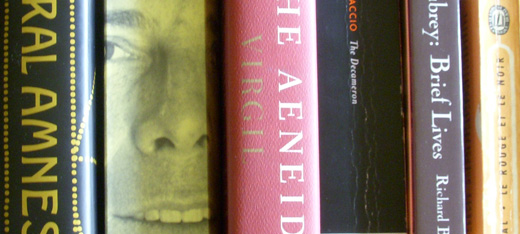Wednesday Morning Read
Today, I finish the last of the books in the original Morning Read roundup, which I put together last October as a way of getting through books that one just doesn’t sit down and read all the way through. But I’m certainly not bidding farewell to Clive James’s Cultural Amnesia. Reading it the first time is only the beginning. The book, a collection of pieces published over the years, is the best kind of testament: improvised by the author during his lifetime.
¶ And yet, how strange — or at least reverberant — it is that my first reading of Cultural Amnesia ends with the entry on Charles de Gaulle. In typical fashion (for those old, pre-Morning Read times), I picked up the new book and began in the middle, or at least with an entry that interested me immediately: the one for Edward Gibbon. I was meditating on a chapter of Decline and Fall at the time, and James’s demythologization, if that’s what it was, of Gibbon’s malachite prose came in very handy at the moment. From Gibbon to de Gaulle: a circuit that neither man would have deprecated.
James’s point of departure with de Gaulle is the death of his daughter, Anne, a Downs’ sufferer. At her funeral, the great man is said to have uttered, “Now she is like the others,” meaning that, at last, Anne was normal; all dead children are dead in the same way. It’s exactly the sort of Racinian, grandly horrific thing that you’d expect, nay, hope for from this pater patriae who, far and away more than any other man of the Twentieth Century, made it possible for the French to look at themselves in the mirror after a century and a half of embarrassment and confusion.
What can’t be disputed is his grandeur. If he had been a true megalomaniac, he would have been less impressive. Napoleon, owing allegiance to nothing beyond his own vision, was petty in the end, and the fate of France bothered him little. De Gaulle behaved as if the fate of France was his sole concern, but the secret of his incomparable capacity to act in that belief probably lay in a central humility.
¶ In Aubrey, the very brief Life of John Taylor, “waterman.” “He came to London and bound himself to a water-man, in which capacity he wrote his poems.” Later, Taylor ran a pub.
His conversation was incomparable for three or four mornings’ draughts. But afterwards you were entertained with old stories warmed over.
Is there anything quite as disappointing as the great wit who recycles?
¶ From James Merrill’s “Self-Portrait in Tyvekâ„¢ Windbreaker”:
                 Americans, blithe as the last straw,
Shurg off accountability by dressing
Younger than their kids — jeans, ski-pants, sneakers,
A baseball cap, a happy-face T-shirt…
Like first-graders we “love” our mother Earth,
Know she’s been sick, and mean to care for her
When we grow up.

